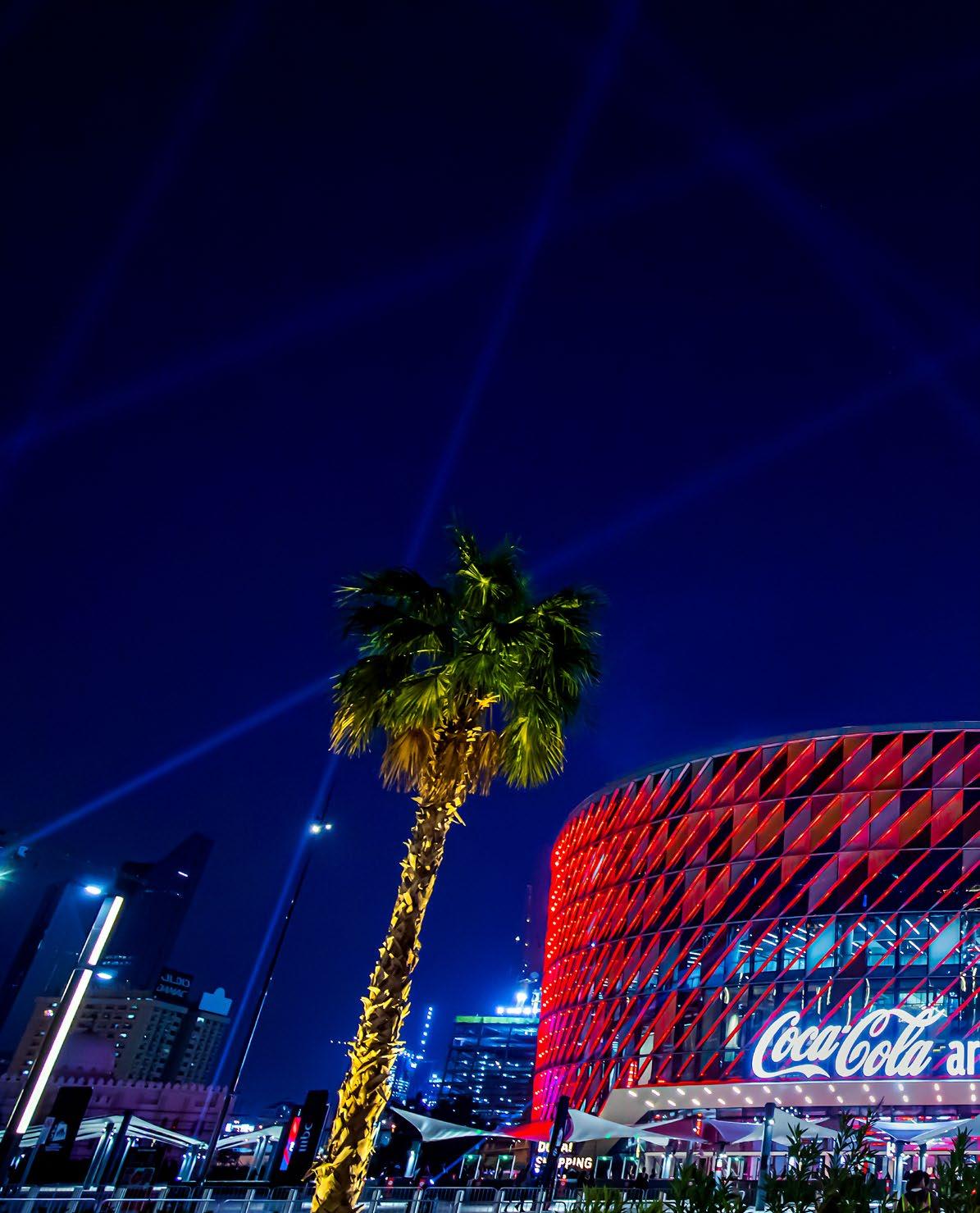
31 minute read
Operation Phoenix: Reopening arenas Venue management from around the
from IQ106
by IQ Magazine
OPERATION
PHOENIX Scientists and epidemiologists predict that the winter months will see another peak in cases of Covid-19, so as arena management around the world draw up plans to cope with their busiest year ever, Gordon Masson, with the help of the European Arenas Association, learns about some of the strategies to reopen venues – and keep them open…
Major concerts and tours are taking place throughout North America and Europe, but scratch the surface and it’s obvious that the coronavirus pandemic is far from over, as many territories still have social distancing restrictions in place, or outright bans on mass gatherings.
In the UK, meanwhile, the entire business is awaiting the findings of the Manchester Arena Inquiry, although the ramifications of that will doubtless have an international impact, too.
Nevertheless, a cursory chat with anyone in the arenas sector yields similar responses: venues are massively oversubscribed for 2022 and 2023, and the volume of shows and tours in the diary mostly surpasses the levels of business enjoyed in 2019.
European Arenas Association (EAA) president Olivier Toth notes that, as the restrictions change on a regular basis, the association’s recent survey of its members only captures a moment in time – in this case, 25 November. Given that the survey was conducted before the omicron variant became an issue, the data is certain to change in the coming days and weeks.
“I was hoping that things would change and everybody would be able to reopen, go to full capacity and all of that good stuff. Yeah. But unfortunately, it’s the other way round. So it remains complicated,” says Toth.
Nevertheless, Toth believes the EAA survey was important to gauge the disparity of restrictions throughout the organisation’s membership – and indeed, all 36 members of the EAA submitted data to help in that regard.
“In capacity restrictions, we see strong differences between the northern part of Europe and the southern part of Europe,” he reports. “In northern venues and western venues, nobody has restrictions. In the south, however, we see no restrictions for 56% of our colleagues, while 44% do have to work with restrictions. In central Europe it’s 75% working with restrictions, while in eastern Europe, it’s similan with 71% having to deal with capacity restrictions.” (See charts on pages 38 & 42)
“Those restrictions will, again, be variable, and there it becomes very complex because they change between countries, but they also change between regions. One example that struck me: we were talking to friends [at an arena in southern Europe] and whereas in my part of Europe everybody thinks and believes that Covid digital certificates are the way out for our sector, this particular venue doesn’t use them. They’re not going to check [certificates] at the entrance, at least not at a time when they participated in the survey. But, on the other hand, they need to keep the bars closed. They need to keep wearing masks and seated shows are mandatory. So no standing.”
Such disparities mean that coming up with an overarching guideline to help arenas across the continent to reopen, is – at present – an impossible task.
That’s certainly the case for some of the major venue operators, internationally.
Ron Bension, president and CEO of ASM Global, notes that while there is no set plan to cover every arena in the company’s portfolio, that network of venues provides its own cumulative strength. “When [the pandemic] initially happened, the focus was on cleanliness, containing the air and those kinds of things to ensure that people were safe and that people didn’t get [the virus]. That’s evolved through the intervening 18 months, and reopening is more about vaccines, tests, face masks, crowd size.
“The good thing about ASM Global is we’ve got more than 300 buildings around the world,
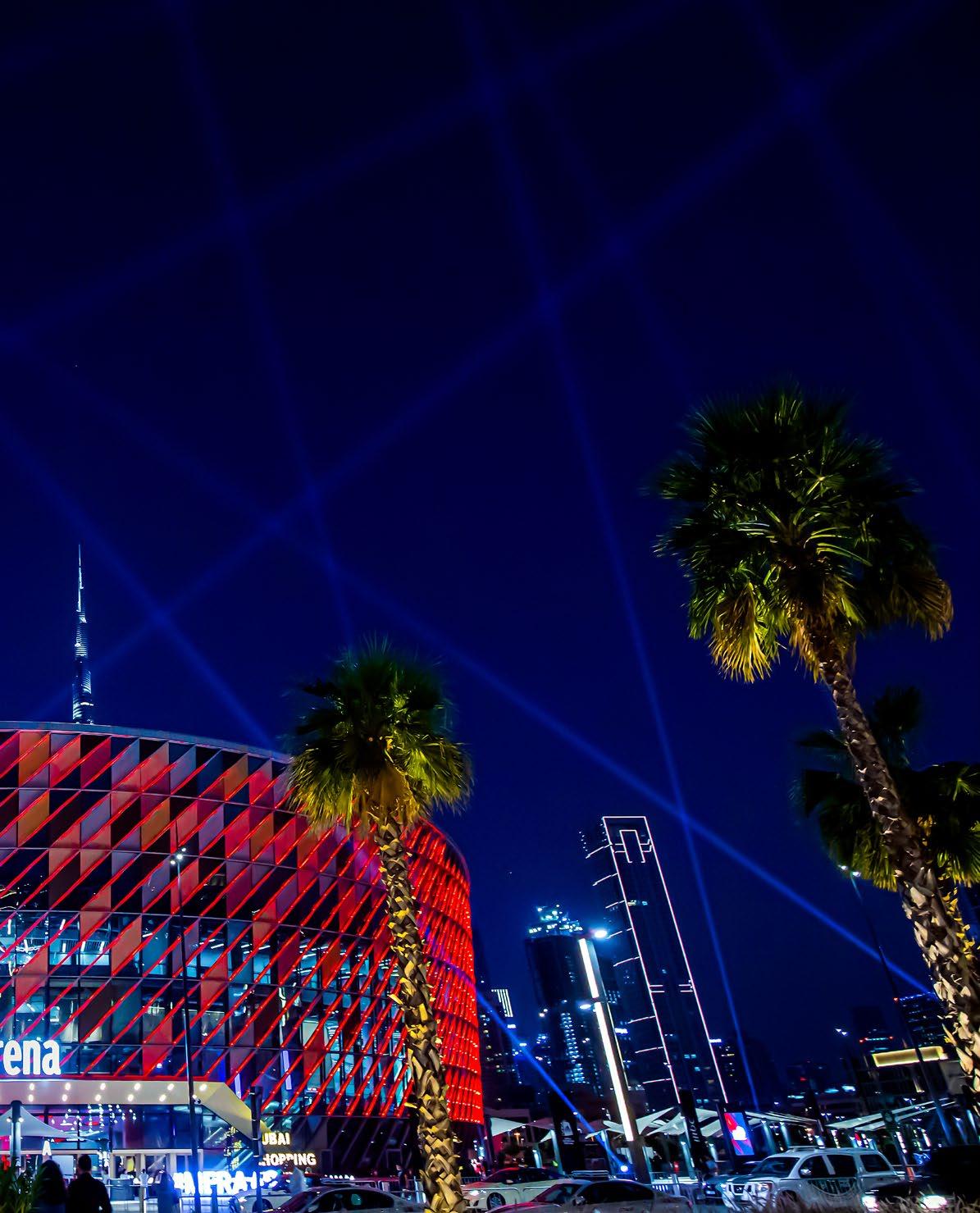
so we’re getting data in real time from everywhere. For example, one twist on a show that happens in Australia can be communicated so that others can be prepared for a similar twist. The advantage we have, and our clients have, is that we’re giving them global data in a real time basis as to what’s happening in the marketplace, and what to be prepared for: it’s rich, more narrative data, about what happened, what we did, how did it work, and what does that mean for you? And if we can provide that to our clients and customers and act upon it in a proactive way, then we and our clients are winners.”
At Oak View Group, executive vice president Brian Kabatznick notes that the company is in a unique situation, given that it is able to integrate Covid mitigation measures into the construction of its properties.
“We’re fortunate with the ten new arenas we’re opening because there’s two methods of Covid mitigation – retrofitting existing buildings or opening new buildings where you’ve got the touchless systems, the HEPA filters, the ability to take fresh air from the outside and run that through the arenas on a much more efficient level. So from an arena perspective, we’re in a very good position with the new buildings because of all the technology we’ve been able to deploy, effectively and efficiently,” says Kabatznick.
“We’re the largest developer of arenas in the world, we’ve invested $5.5billion (€4.9bn) in deployed capital. For Oak View Group (OVG), we’re able to move very quickly and efficiently as an investor, operator, developer, builder, financer. But the first ten arenas are the tip of the iceberg. The next tranche will be similar, major markets, OVG coming in as investor operator, usually with a local partner.”
Quizzed on what steps ASM has taken to ensure the safe reopening of its buildings, Bension points to the collaboration with Drexel College of Medicine to create VenueShield, which he describes as “the number one safety protocol for coming back to business.”
He continues, “It’s not rocket science: it’s just very detailed protocols for backstage, offices, front of house, artist areas, convention centres, meeting rooms, front desk, ticket taking. We take each area and figure out: What are the touch points? What are the interface points? And what do we need to do to ensure guests’ safety at those points, ensure cleanliness at those points? What do we need to do at the end of the day, and before opening, to ensure that we can get the venue up for the next day’s business? It’s extremely detailed.”
Getting Back to Business
One venue that has more experience than most in dealing with pandemic restrictions is the WiZink Center in Madrid, which hosted 84 events, including 44 concerts, in 2020, meaning it is currently the world’s #1 arena in terms of ticket sales.
The arena’s general manager, Manuel Saucedo, recalls, “We tried to convince the national health authorities that we had the capacity to implement distance measures – separating bunches of people to avoid contact between them, installing special ventilation systems to completely renovate the air. Fortunately, we earned their trust, and we got to keep medium capacity permissions when other venues around the world were closed.”
Detailing some of the measures his staff introduced, Saucedo tells IQ, “We focused all our efforts on separating the venue in sections, to avoid contact between spectators as much as possible. Above all, we adapted all our ventilation systems to get a complete renovation of the venue’s air every 12 minutes.
“During this whole time, we went from the total closure, stopping all our activities, to progressively open again. Right now, we can programme events with our full and maximum capacity, 17,400 people, with people standing on the main floor, no distance or seats, but keeping the face mask[s on] at all times. Also, it is not [permitted] to eat or drink while on the main floor, something that is affecting our revenues. But we understand the measures and are happy to be in this situation.”
Talking about his company’s approach to reopening its buildings, Guy Dunstan, managing director for NEC Group ticketing and arenas, tells IQ that staff adopted an in-house approach called Venue Protect. “This incorporates measures that provide safe and secure environments for customers, visitors, staff, contractors, and partners,” he says. “The focus was, and continues to be, on reassurance for our customers and demonstrating to the authorities that large venues like our-
CAPACITY RESTRICTIONS PAN-EUROPEAN
35 of the 36 arenas that responded to the survey are now back to hosting audience attended events
Restrictions and measures vary greatly between countries and regions
57% of arenas that responded are operating without any form of capacity restriction
■ YES ■ NO ■ DEPENDS
12%
57% 31%
selves can manage the risks safely and effectively.”
Noting some of the regulations for large venues in England, Dunstan reports, “We implemented random Covid checks in place at entry points. In agreement with local public health officials, we aim to check as many audience members as practically possible, whilst bearing in mind other safety considerations around ingress ahead of an event. The standards applied at our venues are far above what is generally expected by customers and a vast majority feel safer for having these checks in place.
“We encouraged staff to wear masks, whilst this has not been mandated through current government guidelines. Staff were also provided with additional advice and training, in preparation for our first events of the season. And we’ve worked closely with individuals, companies, and industry bodies from across the industry; the Concert Promoters Association, National Arenas Association, the British Association of Concert Halls, and [live music trade body] LIVE to name but a few. Collaboration across these associations and sharing insight has been invaluable in ensuring a consistent industry approach to safe venues.”
One venue that has benefitted from the VenueShield initiative is Dubai’s Coca-Cola Arena, which is operated by ASM Global. General manager Mark Jan Kar says, “In line with eliminating as many touchpoints as possible, we introduced paperless ticketing shortly after re-opening and now welcome guests to Coca-Cola Arena with e-tickets. All points of sale at Coca-Cola Arena accept contactless payment, this has been implemented to speed up the service process and to adhere to social distancing and reducing touch points guidelines.
“During the re-opening stages, we started with a maximum capacity of 1,500, whilst adhering to two-metre social distancing. Whilst this provided challenges, we developed a loungestyle floorplan, which allowed for groups to sit in their own ‘bubbles’ and a standard set-up that could be used from show to show to reduce setup costs. We are now operating at 80% capacity, which we hope to increase in the future.”
Jan Kar adds, “Since re-opening, our approach has dramatically changed. Our strategy has focused on diversifying the type of events and shows that we bring to the arena – we are no longer just a music venue but an arena that hosts shows from internationally recognised sporting events such as Dubai Ice Show, UKC (cricket), and boxing, to sold-out arena tours from the likes of Martin Garrix and comedy sketches from Wayne Brady. In summary, our strategy has included ensuring that there is something for everyone – and ensuring diversity as we bring acts to the arena.”
Olivier Toth | European Arenas Association
WiZink Center’s ability to provide flexible capacity formats, such as the show with local superstars, Izal, helped the arena to grab the crown as the world’s number one arena in 2020
To Mask or Not to Mask
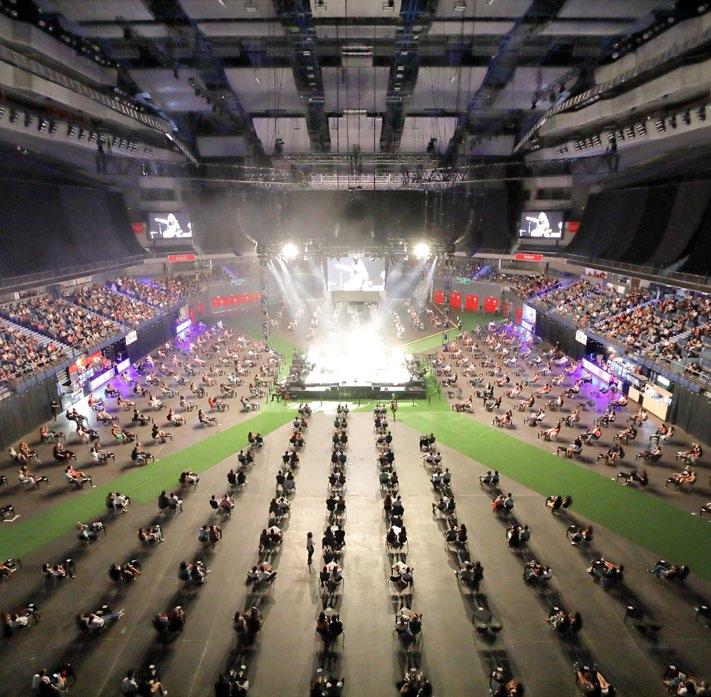
When it comes to access control, Toth says that the EEA survey reveals that more than 60% of the venues based in the northern part of Europe do not have restrictions for access, “Meaning they do the check, you have your tickets, and then you just come in,” he says. “Masks are not necessary, and you don’t have to provide anything apart from proof that you’ve been vaccinated, or that you’ve had Covid and recovered, or that you’ve tested negative.
“Elsewhere in Europe – the southern parts, and the eastern parts – half use the EU certificate for Covid and the other half, don’t use it.”
Specifically on face masks, the EAA survey also reveals regional differences (see charts on page 46). “Northern European venues, 100% no masks, while in the east it’s the polar opposite - 100% are using masks. Elsewhere, 33% of western venues have mask restrictions; 25% in central; and 67% in the south,” says Toth.
“We’ve been fighting to get the European Centre for Disease Control onboard to work with our sector and the European Commission on recommendations to be able to provide a step-by-step safe return of what we do, and a step-by-step return to full capacity. And again, we see that it works in several countries, so we do not really understand why it wouldn’t work in other places. And we don’t really understand why there’s a discrepancy.”
Nonetheless, Toth recognises that politics and cultural differences are playing a part in the
WE ARE CREATING THE BEST ARENAS AROUND THE WORLD.

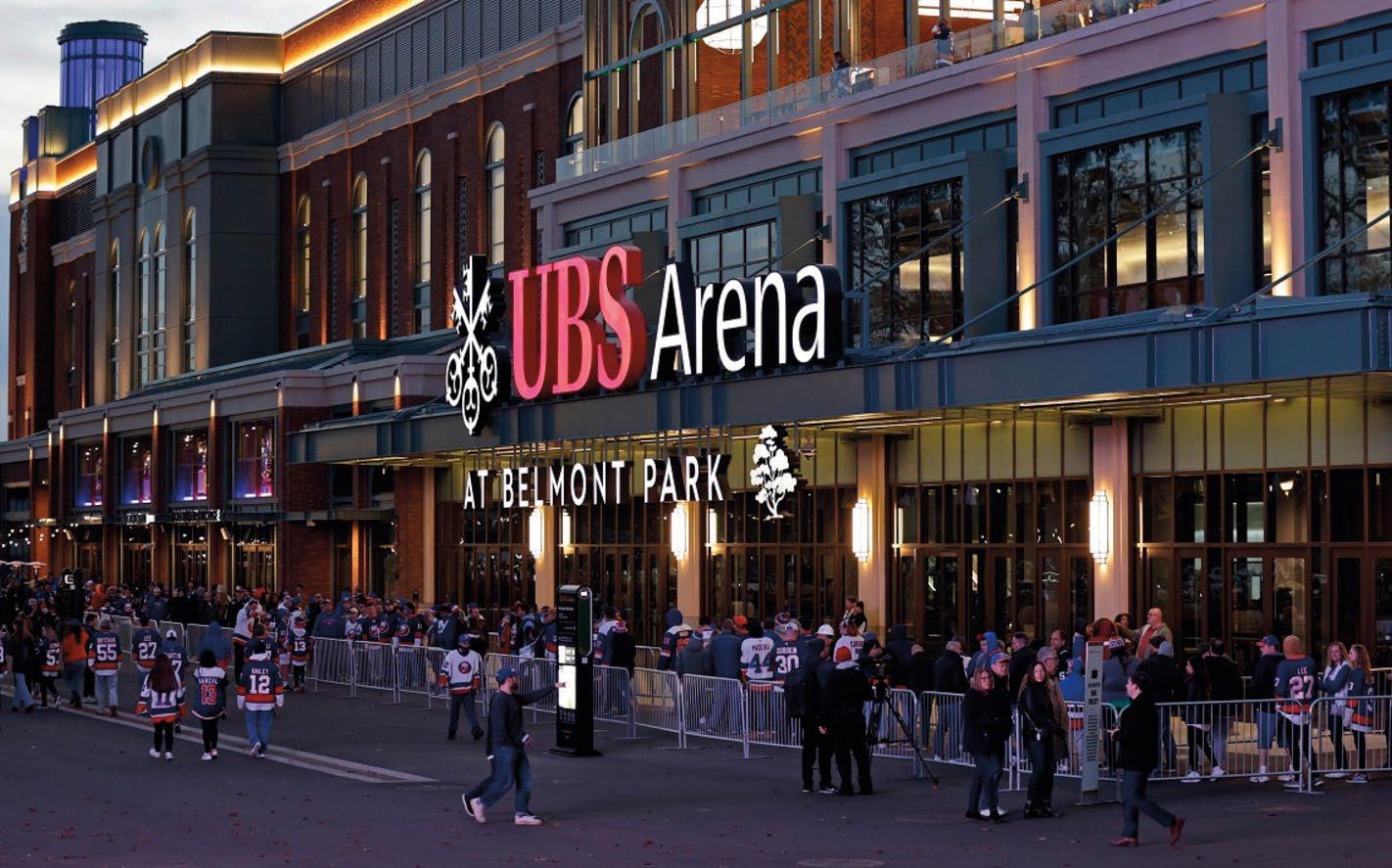

CO-OP LIVE. MORE THAN JUST MUSIC. CO-OP LIVE. MORE THAN JUST A VENUE. CO-OP LIVE. BELIEVE YOUR EARS AND EYES.

THE BEST LIVE MUSIC EXPERIENCE IN THE UK, SORTED. OPENING 2023.
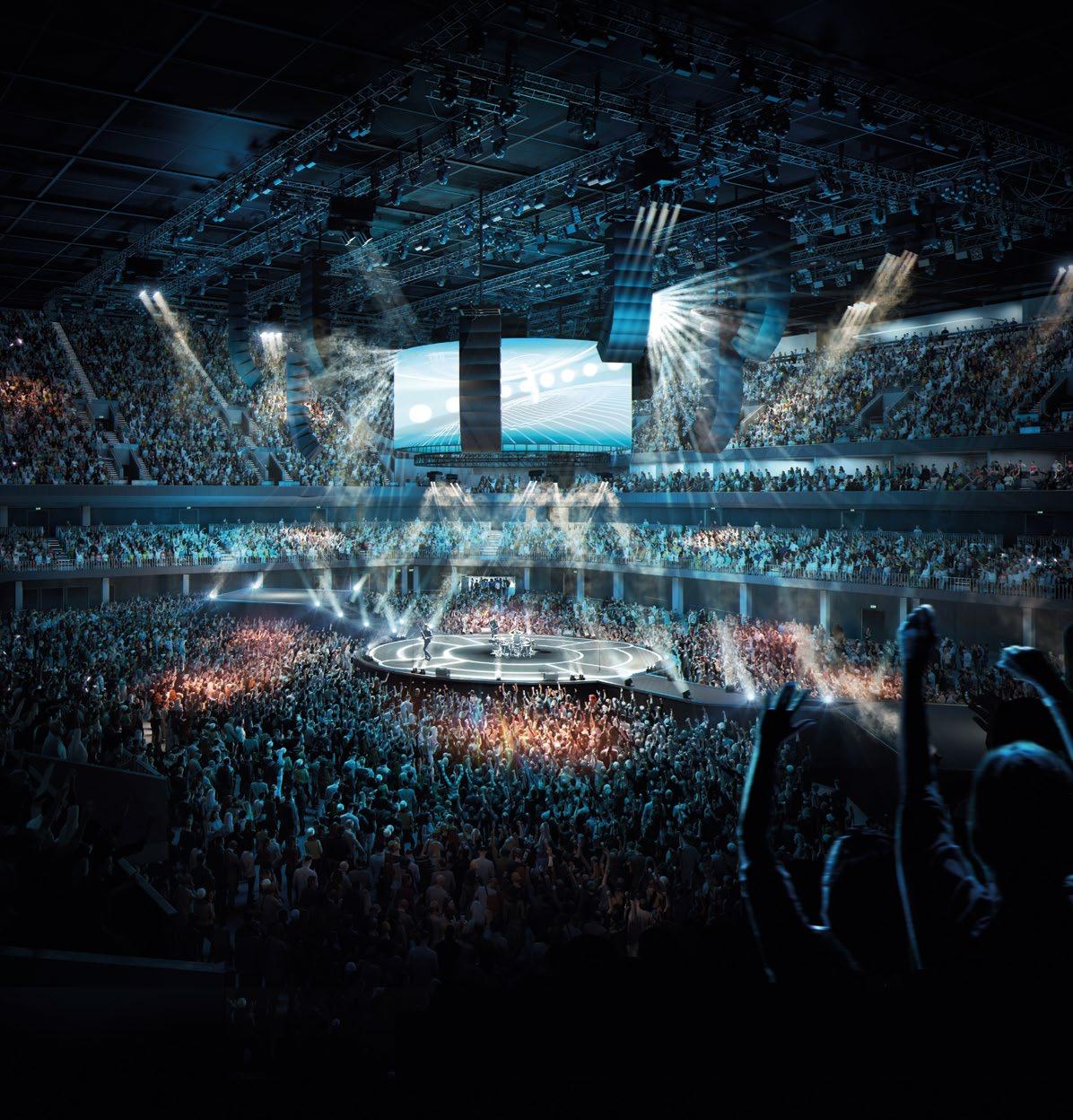
rules that are imposed on arena management, and he applauds the efforts of executives across Europe for the hard work they are putting in to get back to business.
“Our colleague members of the EAA – and those who are not members – have spent a lot of time to get a good understanding of how reopening works,” he says.
And the EAA president believes sharing those experiences can help every venue to reopen sooner rather than later. “We’re in the process of aligning the parameters that are laid out by the European Commission in their recommendations, with experience that we’ve gathered throughout our membership. For instance, us at the Rockhal have contributed; our friends in Lisbon who are open to full capacity, have contributed; we spoke to the French, who have contributed; so we’re gathering the different sets of parameters that are in place, just to be able (if any request comes along from any EAA members or maybe future members) to tell people about how arenas are doing it.”
Indeed, Toth contends that gathering such information could provide the confidence boost the industry needs to kickstart international touring. “We can use it as a signal toward artists and productions, who instead of wondering what goes on in each territory separately, maybe can get some guidance in a more coordinated way.”
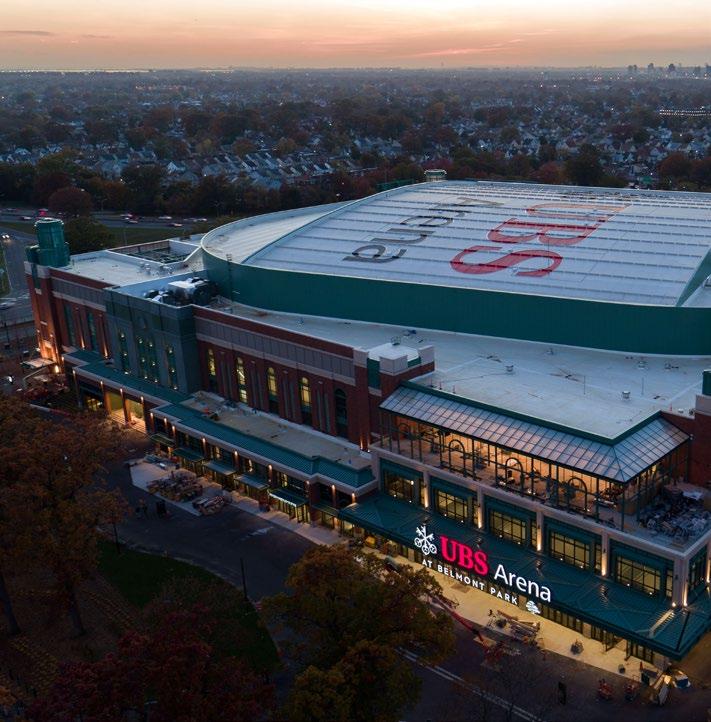
Flexibility
At press time, the Netherlands was introducing tougher rules, during what was supposed to be UBS Arena in New York is the latest addition to the Oak View Group portfolio
CAPACITY RESTRICTIONS BY EUROPEAN REGION
100% 100%
Preliminary results show strong regional trends across Europe
Northern/Western based arenas – Scandinavia and the UK – are currently operating with far fewer restrictions regarding capacity than equivalent venues in Central, Southern and Eastern Europe
■ RESTRICTIONS ■ NO RESTRICTIONS
75%
25% 56%
44% 71%
29%

the end of a three-week partial lockdown period, imposed after Covid cases in the country spiked. Dutch authorities have been hoping that the restrictions would control the spread of the virus prior to the Christmas season.
Meanwhile, the government in Austria initially introduced a lockdown for the estimated two million citizens who have not been fully vaccinated against coronavirus. The controversial move, which was initially due to last for ten days, affected around a third of the population, but was deemed necessary to relieve pressure on the nation’s hospitals. At press time, however, Austria had moved into full lockdown mode, with all but essential businesses closed for the duration, while citizens now face manditory vaccinations.
What such government-imposed rules highlight is the need for arena management to employ a large degree of flexibility in their plans for getting back to business.
“We’ve programmed concerts without knowing what the authorised capacity would be on the date of the event, or without knowing if they would be allowed to be standing, etc. The key was flexibility from all sides,” states Saucedo.
The WiZink chief continues, “We admitted all kinds of modifications, changed booked dates from one month to another or from one year to another; we also adapted our fees to the circumstances... We, remarkably, increased our compromise and bond with promoters.”
NEC Group’s Dunstan comments, “We still aim to improve our processes and protocols wherever possible, and these are under constant review. You have to be agile in these times, as we are all too aware that the rules and regulations can change in an instant. Regular staff briefings are key, plus having strong relationships and regular dialogue with colleagues at the Environmental Health Office, councils, and Public Health England.”
Stressing the need for vigilance, Jan Kar says, “We’ve worked hard to build good working relationships with our suppliers and promoters to understand any restrictions that come into place, and what the impact of these might be. When working with partners, we build in the flexibility to the relationships where we can look at changing the scope at late notice should we need to, as well as scenario planning with our partners to ensure we’re aware of each possibility, as much as we can be.”
Ron Bension | ASM Global
ACCESS CONTROLS PAN-EUROPEAN
EU DIGITAL COVID-19 CERTIFICATE is the most widely implemented access documentation used by 51% of the venues surveyed
20% of venues currently have no entry restrictions OTHER
NONE / SPOT CHECKS 11%
20%
VACCINE PROOF / TEST / ANTIBODIES 17%
EU DIGITAL COVID-19 CERT 51%
As long as Covid-19 remains a significant threat to public health, uncertainty over planning live events and tours will undoubtedly lead to more cancellations and postponements, creating havoc on the spreadsheets of finance departments.
OVG’s Kabatznick notes, “With our corporate office being based in Los Angeles, they have a global view, and they understand that, especially coming out of the pandemic, budgets are fluid. The good news is, with all the naming rights and sponsorship deals that we’ve done during the pandemic – probably about $2bn (€1.8bn) worth – we did have money coming into the organisation when buildings were shut down or about to open.
“So we’ve been in a pretty good position, allowing us to acquire Spectra, announcing all the other deals that we’ve had – we did Cardiff during the pandemic, we broke ground in Manchester during the pandemic, we announced building a new arena in São Paulo during the pandemic. So, you know, we’ve made some bold moves, billion-dollar moves, while the world was shut down, which really shows our commitment to the industry and our belief that we’re going to come out of this better than ever.
“But, ultimately, if you’re asking what is the state of the business, I just talked to the guys in France, and they’re looking at going into a fifth wave, and they may go to another lockdown [in December].”
Such situations obviously impact budgets massively, but ASM’s Bension is also unfazed.
“Planning is critical. And so you plan for the worst – we do that, and we’ve had months to plan,” says Bension. “You put in place your safety protocols but then the risk is that something changes. So now, you’re ready to put on a show and you’re cleared for full capacity, but that show was maybe booked six to nine months ago. And then something happens, you know, there’s another outbreak, or whatever it may be. And so the risk is you’ve got either refunds or your capacity is restricted or whatever. So you have to stay nimble, and you have to be in a position where you work with your promoters and producers, you stay in constant contact.”
Indeed, far from worrying over budget forecasts, Bension highlights his company’s growth during the past year. “ASM Global was created four months before the pandemic. And then the industry shut down. It would have been easy to sit on our hands, but we didn’t do that. Instead, ASM signed up 27 new venues during the pandemic, which is a staggering amount, an almost 10% increase to our venues and a testament to our teams and our credibility within the marketplace.”
He adds, “In the [United] States, we’re currently running dozens of shows a week now, so we’re learning what it takes to check everybody’s vax card or to do onsite rapid testing. And knowing that we can then input that into our budgets and also talk to our promoter partners because no venue can afford to shoulder all of these safety/security protocols on their own.
“In some cases, the artists are demanding all-vax, meaning everybody has to be checked. That requires a lot of checking and extra people. So our ability to be able to quickly understand what’s happening on the ground, what those costs are and put those into our budgets and put those into our dialogue with our promoters from a show-cost perspective, is again, giving our clients a leg up.”
NEC Group’s Dunstan comments, “This period has brought about many challenges, including the difficulty of accurate forecasting. We need to work to a number of variables that were never a consideration pre-pandemic, factor in significantly more rescheduled events and an increase in audience no-shows – which makes resourcing and budgeting particularly challenging. Then there is the volatility of costs, cost increases, and challenges within the labour market. As we see business return to 2019 levels there remains some uncertainty in programming, but with all processes like this, we look at best- and worst-case scenarios.”
And in Dubai, Jan Kar says his budgets are currently based on the continuing protocols of 80% capacity. “Based on early conversations, we would anticipate the Middle East to return as part of the world tour circuit only picking up in Q4 2022,” he says.
Manuel Saucedo | WiZink Center
ACCESS CONTROL BY REGION
EU DIGITAL COVID-19 CERTIFICATE
11%
6% 33% 33%
17%
Busiest Year Ahead?
Many arena chiefs internationally report that the calendar for next year is the busiest they have ever seen, and while that bounce back to business is obviously welcome, everyone is somewhat reliant on their peers in other territories being allowed to operate at full capacity because one or two cancellations could jeopardise the financial viability of an entire tour.
But executives are bullish.
“If you look at Harry Styles, and the Eagles, and The Stones, they’ve been able to accomplish coming out of the pandemic by doing tours in the US by working in the bubble, and being safe,” states Kabatznick. “I think 2022 is going to be a really good year. It’s going to take six months before international touring becomes accessible as nobody is going to tour international without continuity and consistency across borders and across cities. But you would figure at
ADVERTISING ARTWORK
the end of 2022 we’ll be back in full swing, and 2023 will be great.”
Bension agrees. “I think 2023 is going to be the crazy year because a lot of the bands realise there’s no inventory [in 2022]. We’re seeing a real slowdown in new shows being booked because the calendars are full.”
Breaking down the business as he sees it, Bension says, “Australia is significantly further behind than the United States. Their protocols for reopening are much tougher and they’re just starting to reopen travel in and out. In Asia, they’re still quarantining in certain markets, so those territories, especially for touring content, are going to be laggards. Assuming that conventions take a year and a half, and concerts a year to nine months advanced booking, then you’re looking at probably the fourth quarter of 2022 to see a good rebound in those markets.”
And he reveals, “Domestically in the States, we’re gonna probably see a 25% increase in show count. I think the euphoria is somewhat blunted by the fact that many of the shows are rescheduled. So shows that were booked literally in 2019 to play in 2020 are not going to be playing off till 2022. Coupled with there’s only so many Thursday, Fridays, and Saturdays, which is when, from a live music perspective, [everyone] wants to play. So the calendar gets full real quick and there’s only so much capacity because of the rescheduled shows.”
Speaking on behalf of his Rockhal arena in Luxembourg, Toth says, “Looking at the rest of this year, it is okay – we see a lot of transnational cross-border repertoire: French bands, German bands, Belgian bands, and then we see some that would come from other countries and are agile enough to do just a short tour where they can.
“Next year is pretty crowded. It starts off a bit relaxed in January, February, becomes a bit more crowded, and then starting March, it’s huge. Now, the problem still remains the same: if too many different territories in Europe have different sets of restrictions or some close or whatever, that puts in danger any proper planning for a full European tour.
“We may have to restart rescheduling shows. We know from some of our conversations that artists still don’t want to take the risk, and some that could tour in 2022, won’t. So we’re already speaking about dates in 2023.”
Dunstan reports, “Business levels for 2022 are comparative to 2019. The first part of the year will see primarily domestic artists, and we hope to see more international artists returning to market later in the year. The Commonwealth Games in July will be the icing on the cake – a huge event for the City of Birmingham, and all eyes will be on the host venues.”
And in Madrid, Saucedo observes, “If everything we have planned finally happens in 2022, it is going to be a record year for the WiZink Center. But it will also be very important that the calendars become real in other countries. If we keep having restrictions in other European countries, many international tours might be affected.”
Guy Dunstan | NEC Group
Strength in Numbers
One of the major benefactors from the pandemic has been the surge in membership for industry trade bodies, and in many cases, the emergence of new associations to give disparate parts of the supply chain a voice.
One such body is the Arena Resilience Alliance (ARA), of which Toth is a co-founder. “Since we started the ARA, the motto was that it’s the full industry that’s in danger. So we’ve become vocal for the full sector – not just the EAA member arenas but for the 305 venues that we identified through our research. We’ve also raised our voice for promoters, agents, and artists, and for sports teams, for that matter, taking that concept that the venue is the hub for all those businesses to operate. If we are closed, nobody’s earning their money.”
While ARA has been winning new allies in Brussels, the EAA has also been evolving, and with Toth now at the helm, he is hoping the num-
MASKS
MASK WEARING: PAN-EUROPEAN MASK WEARING: By Region
100% 100%
■ NO 46% ■ YES 48% ■ DEPENDS 6%
Arenas in the Northern and Western regions (Scandinavia and UK) are operating with significantly fewer restrictions such as mask wearing requirements 67%
33% 67%
50%
25% 25% 33%
ber of arena members will swell during his tenure.
“We’ve revised our strategy as a whole, and we’ve identified four pillars that we want to build this on,” he informs IQ. “There was a strong focus on exchange of best practice and networking before, and we decided that we want to take best practice exchange and push it towards something that you could really call education training in a proper sense. Obviously, we’ve learned through the EU subgroup back in the days, and then the ARA, how important advocacy and lobbying are, so that is the third of our pillars. And then last but not least, it’s content development. We at the Rockhal are in a very different scenario from most of the other EAA members because we also operate as a promoter. So we have a very active role in the content of our agenda. While most venues don’t have that role, they are very good conversation partners to content providers, and to promoters. So that’s the fourth pillar.”
During the last six months, the EAA added a further three arenas – 10% of its overall membership – but Toth is determined to bring in new venues and new ideas to strengthen the association.
“It’s very important that people want to join [not only] because they see [the] value but [that] they are also willing to bring their experience to the table to enhance that value, delivering that classic win-win. And we can multiply that, then you really create that strong voice that we’ve been discussing for the last [several] months. You create a lot of know-how and a lot of cultural exchange throughout European territories
Staffing
Dealing with personnel shortages has become a daily issue for the arenas sector during the pandemic, but ASM Global chief Bension believes that the nature of live entertainment should resolve such matters, given time.
“In the UK, we’ve noted the inability to attract the proper counts for security. So we work with our security partners to put in place some short- and long-term incentives to help that, and I think we’ve done a really good job,” he says. “Shockingly, in the States, we’re seeing some softness in the food and beverage area. And if there are multiple events in a specific town, in multiple venues, we’re seeing some security shortfalls. But we have such a strong footprint and in many cases, multiple venues within a region, we can draw upon our sister venues to bring staff in to an event.
“Ultimately, we’re not in the banking business. We’re in the entertainment business. And if we’re paying a competitive wage and you have your choice to be a checker at Walmart or work at Soldier Field for a football game… What would you do? I suspect we win.”
Kabatznick also believes the buzz around live events will help the arena sector rebound.
“In Seattle, we opened the [Climate Pledge Arena] in the city centre, which has access to a significant amount of labour,” he states. “And for the UBS Arena in New York, though it’s not in the city centre, it’s on the outskirts of Queens, the beginning of Long Island, giving us access to 10 million people. So, we felt that the two new buildings provide us an opportunity to recruit and train new staff, pay them a fair wage, and have them feel the excitement of opening a new building and being part of two billion-dollar arenas.
“Opening up new buildings, there’s just an excitement, and you feel that you’re part of something new and innovative, and thrilling.”
In Birmingham, England, Dunstan observes, “There are less people and more competition to attract casual labour to our sector than ever before. Ever since we were given the green light to return to full-capacity events, we have had a big recruitment drive, utilising agencies, regular recruitment days, etc, to ensure there is no impact to future event delivery. The importance of training the new staff and refresher training for returning staff has been integral in phasing staff back into the venues, with particular focus on customer service, safety, and the new Covid-related measures being central to our training programme.”
Lessons
The hammer blow of a global pandemic may have destroyed other businesses, but the genuine optimism of those in the arenas sector underlines the resilient nature of arena personnel around the world.
“I think the lesson in general was: while we were shut down was the best time to accelerate. And that’s what ASM Global did,” says Bension. “A lot of venues have also taken advantage of the downtime to figure out what do we do when we
FOOD & BEVERAGE
F&B SERVICE: PAN-EUROPEAN F&B SERVICE: BY REGION
80% 100%
75% 78% 86%
■ YES 83% ■ RESTRICTED 17%
20% 25% 22%
14%
reopen? There is going to be a ton of volume, and I think for the most part people are prepared. If they’re not, shame on them. They’ve had two years!”
“Our incident scenario planning has proved extremely valuable,” says NEC Group’s Dunstan. “Ensuring you have the right contacts to-hand in an instant is also worthwhile, not only does it save time when you need to most, it means you already have the relationships there when you need to ask for support.
And Dunstan believes that understanding the impact for each part of the supply chain is one of the pandemic’s biggest takeaways. “We have worked really effectively with promoters and LIVE, plus cross-industry associations, with the NAA and CPA being particularly key. It was so important in enabling the industry to get back on its feet, supporting each other to ensure the future looks more positive for us all.”
Providing tips for other venue operators who are yet to reopen their doors to the public, Dunstan says, “Expect the unexpected! Our industry had been lobbying for timely visibility and certainty on government restrictions and guidance to enable us to plan effectively, but so often throughout the pandemic we were left in the dark until the last minute.”
He also advocates regular staff engagement. “It’s our staff that make the business move and are key to ensuring smooth event delivery. You need to keep them fully informed as they are part of the reopening process.” And Dunstan adds that the sharing of information is crucial. “In such a fast-changing environment, you need to react quickly. By gaining insight from key sources and sharing your own insight, it allows you to manage changes effectively and in a timely fashion.”
In Dubai, Jan Kar says that rebuilding fan confidence is a major priority. “For consumers, after not attending live events for such a long period, it’s something that any arena management should focus on when re-opening. From ensuring that correct precautionary measures are in place to social distancing, it’s important that consumers feel comfortable in returning to live event venues. Similarly, it’s important that confidence is built with stakeholders and partners, including promoters, tourism boards, and owners – maintaining and building strong relationships is essential to any re-opening strategy.”
“Arena management companies should consider a much more competitive pricing structure in a reduced-capacity landscape,” continues Kar. “Also, diversify your event line-up: pre-covid, certain arena management companies may have had a preference over certain events – such as sports, music, etc. As entertainment destinations re-open, they should look at diversifying their line-ups to accommodate new shows. The market has changed, and it’s important that to survive, venues adapt.”
Summing up the prospects for global arenas going forward, OVG exec Kabatznick concludes, “More people are listening to music than ever before, and more people are playing music than ever before. Just as we came out of the 60s with rock & roll, and morphed into disco, and hiphop, and rap, and EDM, the next generation of music to come over the next five years will be interesting and creative and allow our live entertainment venues to be incredibly successful.”
Brian Kabatznick | Oak View Group
EAA ARENAS
ARENA
Wiener Stadthalle
CITY
Vienna Brussels Forest National Brussels Accor Arena Paris
COUNTRY
Austria Belgium France
REGION
Central Central Central
Mercedes Benz Arena Berlin
Germany Barclaycard Arena Hamburg Germany Olympic Park Munich Germany Central Central Central
Hall Duo Rockhal Ahoy O2 Arena Saku Arena Stuttgart Germany
Central Esch-sur-Alzette Luxembourg Central Rotterdam The Netherlands Central Prague Talin Czech Republic East Estonia East
Arena Riga Riga
Zalgirio Arena
Kaunas Avia Solutions Group Arena Vilnius Arena Gliwice Gliwice Latvia Lithuania Lithuania Poland East East East East
Tauron Arena Krakow Poland East
Helsinki Hartwall Areena Helsinki Finland
Telenor Arena Scandinavium Malmö Arena Oslo
Norway Gotenburg Sweden Malmo Sweden
Stockholm Live Stockholm Sweden
Budapest Arena
Budapest Hungary Mediolanum Forum Milan Pallazzo Dello Sport - Roma Rome Italy Italy
Altice Arena Palau Sant Jordi Lisboa
Portugal Barcelona Spain Palacio Vistalegre Madrid Spain
Navarra Arena Pamplona Spain
St Jakobshalle Basel Switzerland North North North North North South South South South South South South South
Hallenstadion Zurich Switzerland South
SSE Arena Belfast Belfast Northern Ireland, UK West
SSE Hydro Glasgow
Scotland/UK Resorts World Arena Birmingham UK SSE Arena Wembley London UK
The O2 London UK West West West West
AO Manchester Manchester UK West









